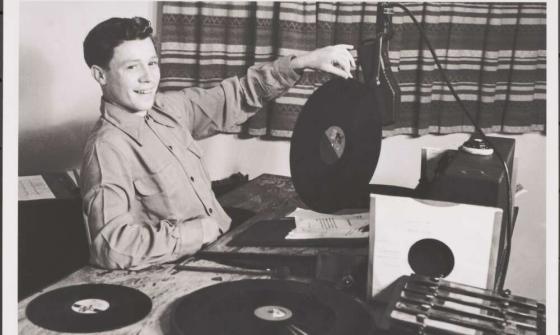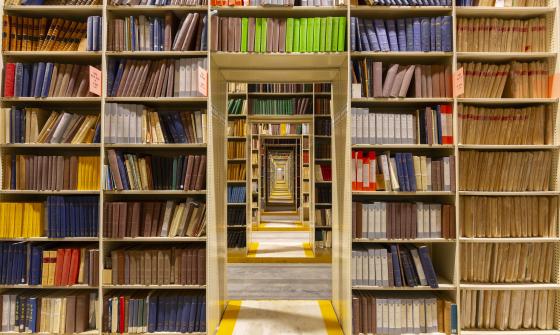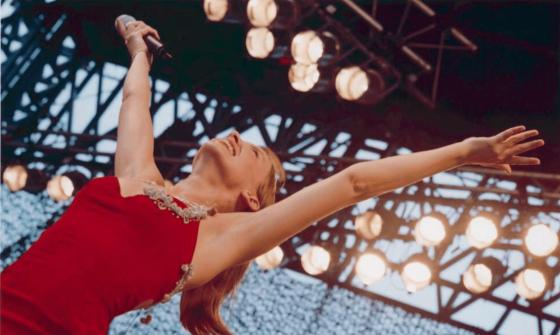National Press Club address recordings
The Library’s Oral History and Folklore collection holds over 900 audio recordings from the National Press Club of Australia luncheon addresses including names like Margaret Thatcher, Richard Attenborough, Lowitja O’Donaghue and every Australian Prime Minister between 1964 and 1994.
This video will help you to find this interesting collection and show you how to search and listen to the digitised recordings online.
Discovery Video: National Press Club Address Recordings
Hello and welcome to this discovery video about one of the Library's less well-known collection areas: our recordings of National Press Club addresses. My name is Aaron Meinergen and I'm the Digital Education Coordinator here at the National Library of Australia.
Uur collection of Press Club addresses is found within our Oral History and Folklore collection. This collection includes a rich and varied array of recorded stories folklore and spoken knowledge.
The National Library of Australia acknowledges Australia's First Nations peoples, the First Australians, as the traditional owners and custodians of this land and we acknowledge them as the first storytellers of this continent. We give our respects to their elders past and present and through them to all Australian aboriginal and Torres Strait Islander peoples.
Founded in 1963 as a lunch club for media covering the goings-on of government here in canberra, the National Press Luncheon Club, as it was then known, hosted just four speakers at the Hotel Canberra in its first year. The club steadily grew in membership and influence and in the next year eight speakers delivered addresses.
The club officially changed its name to the National Press Club in 1968 and it moved to specially built premises in Barton, Canberra, in 1976. Today the National Press Club hosts around 70 formal lunches and speakers a year and is something of a mainstay on the Australian political and media landscape. The club attracts speakers from a wide range of professions, both domestic and international, who speak on matters political, commercial and cultural.
From 1963 to 1996, the National Library of Australia was responsible for recording and archiving the press club addresses. Today our collection holds 907 recordings made during this period of those recordings. 886 are fully digitised and are freely available to listen to online. This video today aims to show you how to find and listen to this incredible series of recordings.
Like all things in our catalogue, the best place to start is our website nla.gov.au or you can type nla into any search engine and you'll find your way here. Because the press club addresses are in our Oral History collection, we need to start by locating all the audio in our collection. There's several ways to do this. In our webinar, Introduction to oral history, there's some instructions on how to use a catalogue search to find all the audio material but I'm going to show you another way. You can navigate to the audio in the collection the way I'm going to show you today uses our collections menu which you can see along the top of the page here. If we hover the mouse over this header, you'll see a drop down menu appear on the right. There are some web pages giving you a bit of an overview of the Library, including things about our collecting statistics, collection policies, but what we are looking at today are these categories listed on the left down the bottom. We can see Oral History and Folklore collection.
If we click that, we'll be taken to the landing page. Scrolling to the bottom, you can see there are a few oral history projects that have been highlighted but what we're going to use today is this link just here. Once we click through here, it'll take us to the catalogue with all search criteria for oral history applied. So with very little work, we have almost 6,000 oral history recordings at our fingertips. We're after something very specific today though. The best way to find something in the catalogue that's part of a particular series is to use the narrow search function down the side here. We can scroll down and find our way through the headings. We can see series here with a number of entries. When browsing generally, you can click more and see everything on offer. Conveniently for us though, the series we want is right here at the top: National Press Club luncheon addresses.
The number here in the gray brackets indicates how many entries fit that section. Clicking through here we can find all the entries listed alphabetically by author. In this case, the author means the speaker giving the address. Using the sort function, you can customise how you'd like to see the results. For example, if we sort by date oldest to newest, we can see that our earliest press club recording is Prime Minister Robert Menzies in 1964, but how you want to sort your results is up to you. So we have 886 results. If you for the time you can browse all entries using the page links across the top here for a comprehensive scan of the series, however if you're after something specific or just want the most efficient way to find something, again using the narrow search function is the way to do it. Here we have a number of headings and we'll look at this one here: the author heading as I mentioned. It'll give you the name of the speaker. Now you will see that some results are catalogued as the press club as the author, but some will be listed separately by speaker. The narrow search author function is not exhaustive. It will show the top 35 most populated results so people with only one entry will not be listed. However never fear, if you know there is a recording or you want to see if there is one there's a quick way to do this. So, for example, I know we have a press club address by Bishop Desmond Tutu, but his name isn't in the list here. So if we use the search function at the top of the page here and type in the name of the person and limit to audio, we can see only the audio results for that person are listed here and here are his two press club addresses right here. You can also do this for other keywords.
So let's try Prime Minister. Here you can see we get a number of results for anyone tagged with prime minister, so not just Australian prime ministers, we have prime ministers from all across the world. The subject area is another filter that can help you in your search. The topics of the press club range widely. Many are political as you can see including 33 federal budget addresses and addresses by prime ministers, deputy prime ministers etc. It's not all politics though. You can see down here there are 10 labeled as actors. If we click through, we can see the results including some very familiar names. You will also note now that the author list now only reflects the speakers who are tagged in the subject area as actors. Using the narrow filter fields in conjunction with each other will help you get the most out of your search.
It's also worth exploring the subject tags a little more to see what else the collection holds in connection with a speaker or a group or a subject. Often a catalogue entry will say if there are photos associated with the speaker. All you have to do to see is click the name of the speaker in the subject tab down the bottom here and it'll show you what other items the collection holds. The last filter worth mentioning is the Decades tab which I feel speaks for itself. It'll only show addresses delivered within the decade selected.
I encourage you to spend some time trying out some of these combinations to explore this series of recordings. I would also say it might very well be worth heading over to the National Press Club website and having a look at their archive of speakers. You can download a list of all their past and future speakers. It'll give you a date, a name and the topic on which was spoken about. You can then cross check to see if we hold those recordings.
But how do you go about listening to one of these recordings? Once you've actually found it, if we look at the catalogue list here, we can see all these blue 'Listen Now' tiles. Anything with one of these is freely available to listen to. So let's take a look at one. Let's have a look at famous French explorer, scientist, photographer and filmmaker, Jacques Cousteau. You can see the result here and you can see it has a blue 'listen now' tile.
If we click on the tile it will take you straight through to the player portal, or you can click on the catalogue title and it will give you all the catalogue entry details. You can use this link down the bottom and it will take you back to the audio player. In the audio player, there are terms and conditions to read through. If you're happy to accept and abide by the access conditions, click 'I accept'. You'll then see the Trove audio player. The controls up the top are just like most media players: play, stop and volume slider.
Many of the sessions, particularly high profile names, will have timed summaries. These are basically topic overviews for particular chunks of the recording. You can skip to a section that interests. You can click the play button on the side here and it will jump to that section. You can also turn syncing the summary on or off. So if we hit play from the start, you'll see it highlights the first summary, but if we click through the play bar to the end, you can see the sync summary then jumps to the relevant section. This is a very useful tool but it's worth noting again that not all the Press Club recordings will have this function.
The National Press Club address series in the Oral History and Folklore collection is a rich resource with some fascinating insights and thoughts from some of the biggest names on the political and cultural landscape in the latter part of the 20th century. I encourage you to explore this collection and the wider collection at your leisure there's definitely enough there to keep you busy for some time.
Thank you for watching you
Visit us
Find our opening times, get directions, join a tour, or dine and shop with us.


